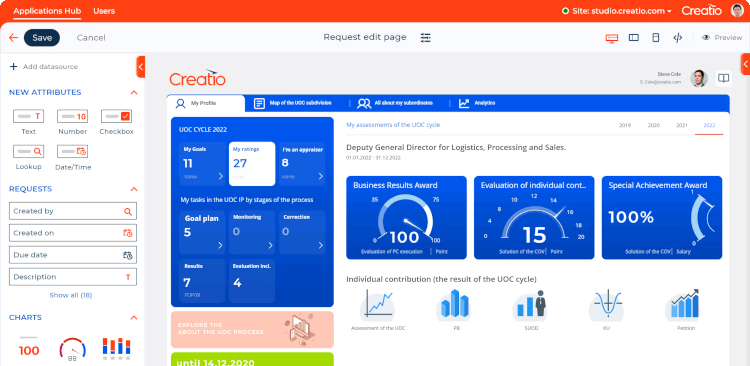No-Code Open Platform Data Source Production: Empowering Services to Build Faster
No-Code Open Platform Data Source Production: Empowering Services to Build Faster
Blog Article
Discovering the Advantages of Scalable Data Sources That Need No Coding Skills for Reliable Data Management Solutions
The appearance of scalable databases that get rid of the need for coding abilities presents a transformative opportunity for organizations looking for reliable information monitoring solutions. As we consider the effects of such advancements, it ends up being critical to examine how they can reshape the landscape of data management and drive sustainable growth in an affordable environment.
Enhanced Availability for Customers
Enhanced accessibility for individuals is a critical aspect of scalable databases, ensuring that information management systems are straightforward and instinctive. In a period where data-driven choices are extremely important, access permits a bigger series of individuals, including those without extensive technological competence, to engage with database systems effectively. This democratization of information gain access to assists in enhanced collaboration across divisions, encouraging workers to draw out insights and make notified decisions.
User-friendly user interfaces, such as drag-and-drop features and aesthetic data representation, simplify intricate data interactions. These enhancements lower the understanding curve associated with standard database monitoring, allowing customers to concentrate on leveraging information instead of grappling with technological complexities. In addition, scalable databases frequently include real-time analytics and personalized dashboards, giving individuals with immediate understandings tailored to their certain requirements.

Cost-Effectiveness and Source Cost Savings
Efficient data administration not only hinges on ease of access however likewise on cost-effectiveness and resource cost savings. Scalable databases made for individuals with no coding abilities considerably reduce monetary burdens commonly related to traditional data source management systems. By removing the requirement for specialized shows experience, organizations can allot their resources extra efficiently, concentrating funds on core service activities instead of substantial training or hiring experienced personnel.
Furthermore, these data sources typically make use of cloud-based services, which additionally reduce expenses connected to hardware and upkeep. Organizations can scale their data source solutions according to their requirements, staying clear of the expenses incurred from over-provisioning resources. This versatility suggests businesses can adapt to changing needs without sustaining unneeded costs, resulting in considerable lasting financial savings.
In addition, user-friendly interfaces enhance information access and monitoring processes, minimizing the moment invested in management tasks. This effectiveness translates into labor expense financial savings, enabling teams to concentrate on calculated campaigns instead than regular upkeep. On the whole, taking on scalable data sources that call for no coding skills fosters a more affordable technique to data administration, allowing organizations to maximize their sources while keeping high degrees of functional effectiveness.
Improved Partnership Across Teams

Moreover, scalable databases promote smooth communication among staff member. With user-friendly user interfaces that call for no coding abilities, employees can quickly produce, change, and share records or control panels tailored to their specific needs. This democratization of information empowers non-technical individuals to contribute insights, enhancing the collective environment.
Furthermore, these databases support concurrent access, permitting several customers to work with the same dataset simultaneously. This feature improves productivity, as groups can engage in joint data evaluation without the danger of variation control problems. The capability to leave notes or comments directly within the database further promotes discussion and makes clear information analyses.
Streamlined Data Administration Processes
In today's data-driven atmosphere, organizations recognize the need of structured information administration processes to maximize performance and precision. By leveraging scalable data sources that need no coding skills, services can streamline their data handling and reduce the intricacies typically related to typical data source systems. This ease of access empowers non-technical customers to involve directly with data, promoting quicker decision-making and lowering reliance on specialized IT personnel.
Structured data management procedures improve workflow by automating regular jobs such her response as data access, recognition, and reporting. Automated data combination guarantees that details from different sources is accumulated effortlessly, eliminating silos and cultivating a combined sight of essential service metrics (no-code). User-friendly user interfaces enable employees to manipulate Related Site information conveniently, enabling them to generate insights that drive critical efforts without the demand for comprehensive training.
This efficiency not only speeds up operational processes yet also decreases the potential for human error, making certain that data continues to be accurate and dependable. Inevitably, streamlined information management procedures via scalable data sources lead to improved efficiency, permitting companies to focus on core activities while making sure that their information administration techniques are reliable and efficient.
Scalability for Expanding Services

For increasing ventures, the capability to scale up or down is important. A scalable database can handle an increase of information produced from new consumers, items, or services, ensuring that organization procedures stay uninterrupted. These data sources offer the capability to take care of peak tons efficiently, which is click for more info crucial throughout durations of quick growth or seasonal spikes.
Furthermore, lots of scalable database options are designed with straightforward interfaces that need no coding abilities, encouraging non-technical staff to manage information properly (no-code). This democratization of data monitoring enables companies to assign sources strategically and lower dependency on specialized IT employees
Ultimately, taking on a scalable database not just enhances operational performance however additionally fosters an atmosphere where businesses can develop and introduce without the constraints of standard data source systems. This adaptability settings organizations for lasting success in today's affordable landscape.
Conclusion
In conclusion, scalable databases that require no coding skills provide significant advantages for efficient information management. By improving information monitoring procedures and offering scalability for growing companies, such solutions enable companies to adjust to altering demands effectively.
Boosted accessibility for individuals is an essential facet of scalable databases, guaranteeing that data monitoring systems are instinctive and easy to use.Straightforward user interfaces, such as drag-and-drop functions and visual information representation, simplify intricate information communications. Generally, taking on scalable data sources that require no coding abilities promotes an extra cost-efficient method to data administration, enabling companies to maximize their sources while preserving high levels of operational effectiveness.
By leveraging scalable databases that need no coding skills, organizations can simplify their information handling and decrease the intricacies usually associated with standard database systems - no-code.Structured data management processes enhance operations by automating routine tasks such as information access, validation, and coverage
Report this page